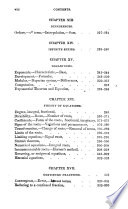 | Stephen Chase - Algebra - 1849 - 348 pages
...sometimes also the RADIX (§23. d), of the system. Hence, for a given base, § 312. The logarithm of any number is the exponent of the power to which the base must be raised, to produce that number. Thus, 2 is the logarithm of 100 to the base 10 ; because ~2 is the exponent of the power... | |
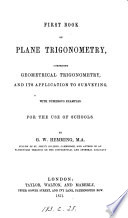 | George Wirgman Hemming - 1851 - 176 pages
...the logarithm of the number N to the base a ; that is, the logarithm of any number to a given base is the power to which the base must be raised to produce the number. This is commonly expressed by the equation x=\og a N 32. When the logarithms of numbers to... | |
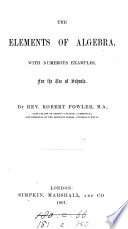 | Robert Fowler - 1861 - 426 pages
...number from 0 to » may be regarded as a power of that base. The " Logarithm" of a number is the index of the power to which the base must be raised to produce that number. If 4 be the base, then 4 s = 16 4 1= I And these equalities may be written log. 16 = log.... | |
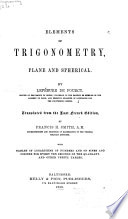 | Lefébure de Fourcy (M., Louis Etienne) - Trigonometry - 1868 - 350 pages
...to the law of continuity and do not reproduce all numbers. The logarithm of a number to a given base is the exponent of the power to which the base must be raised to become equal to the given number. 4. Since a 1 =<z, a°=l, and or°° =0, or a+°° =0, according as... | |
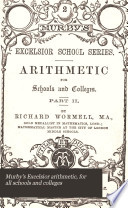 | Richard Wormell - Arithmetic - 1868 - 184 pages
...logarithm of 59049 to the base 3. 357. Hence tie logarithm of a number to a given base, is the index of the power to which the base must be raised to produce the number. 358. Any number may be taken for the base, as for example 5. Thus :— Logarithm 012345 6 Number... | |
 | Richard Wormell - Arithmetic - 1868 - 178 pages
...logarithm of 59049 to the base 3. 357. Hence the logarithm of a number to a given base, is the index of the power to which the base must be raised to produce the number. 358. Any number may be taken for the base, as for example 5. Thus :— Logarithm 012345 6 Number... | |
 | Richard Wormell - Arithmetic - 1868 - 178 pages
...logarithm of 59049 to the base 3. 357. Hence the logarithm of a number to a given base, is the index of the power to which the base must be raised to produce the number. 358. Any number may be taken for the base, as for example 5. Thus :— Logarithm 012345 6 Number... | |
 | Lefébure de Fourcy (M., Louis Etienne) - Trigonometry - 1871 - 316 pages
...to the law of continuity and do not reproduce all numbers. The logarithm of a number to a given base is the exponent of the power to which the base must be raised to become equal to the given number. 4. Since a 1 =<z, a°=l, and a"" 00 =0, or a* 00 =0, according as... | |
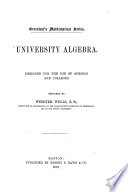 | Webster Wells - Algebra - 1879 - 468 pages
...for 4 years and 6 months ? XLI. — LOGARITHMS. 444. The logarithm of a quantity to any given base, is the exponent of the power to which the base must be raised to equal the quantity. For example, if a" = m, x is the exponent of the power to which the base, a, must... | |
 | Webster Wells - Algebra - 1880 - 498 pages
...for 4 years and 6 months ? XLI. — LOGARITHMS. 444. The logarithm of a quantity to any given base, is the exponent of the power to which the base must be raised to equal the quantity. For example, if a 1 = m, x is the exponent of the power to which the hase, a, must... | |
| |